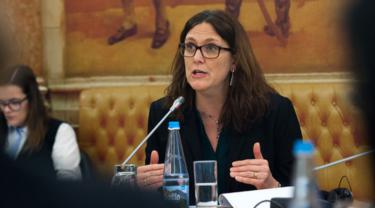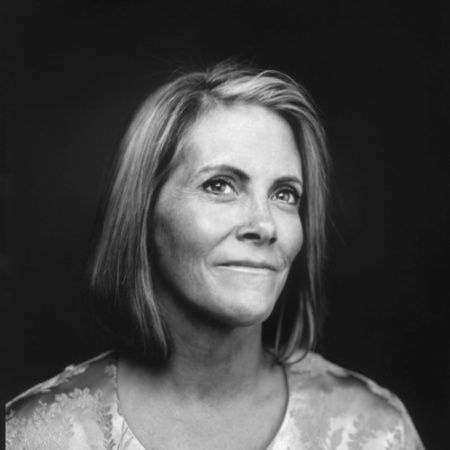
EU Trade Commissioner: Open to progressive trade with the world
There has never been a more important time to defend progressive trade policy. So said the European Commissioner for Trade when she spoke in Ottawa this week.
Cecilia Malmström discussed what she meant by “progressive trade policy” and how the EU and Canada could pursue one “that is effective, transparent and based on values.” She noted that such a trade policy recognizes there are benefits to both sides and is also fair and rules-based.
“Trade should not mean a race to the bottom on standards, or come at the cost of the environment,” she said, and added that such initiatives as corporate social responsibility, eco-labelling, fair trade, and recycling must be considered.
“The success of CETA [Comprehensive Economic and Trade Agreement] will help us take that agenda forward,” she said. “It is a model for progressive trade that promotes values; a template to shape globalization.”
She said Canadians already sell more than $40 billion worth of goods to Europe, and $17 billion in services. That number is sure to rise as CETA comes into force this spring, ultimately ending 99 per cent of all tariffs and opening markets such as services and public procurement.
When she closed her remarks, she offered a rebuke of the U.S. administration.
“Rising protectionism could threaten the open societies and open economies that have brought freedom and opportunity to the people of Europe, Canada, and the world,” she said. “In an age when some want to rebuild walls, re-impose barriers, restrict people’s freedom to move, we stand open to progressive trade with the world.”
Malmström answered questions from Toronto Star columnist Paul Wells and the audience. This is an edited sampling:
Paul Wells: At times, the previous government was frustrated by [CETA] negotiations and said it was a polite fiction that the European Commission has a mandate to negotiate trade and make the tradeoffs that are necessary. Is it a little bit like herding cats when one negotiates with the European Union?
Cecilia Malmström: No, mostly not. It’s true, the commission has a mandate to negotiate, but we are 28 countries; there are elections and there are always events happening. And ultimately, we need to get it through 28 member states and the European Parliament.
PW: If trade is truly free, how can it be progressive? Doesn’t trade decide where it wants to go? To what extent can you control massive bilateral exchanges?
CM: Trade is free, but it’s not totally uncontrolled. That’s why you do trade agreements. We set up the rules, we give possibilities, opportunities. We take away obstacles and a lot of the red tape. Certain rules are still there because there are laws on labour standards, child labour, environmental laws, etc., so it’s not totally free.
PW: Here in Canada, one could have the impression that CETA was the last great trade deal because of what’s happening with TTIP [Transatlantic Trade and Investment Partnership]; and the TPP [Trans-Pacific Partnership] is officially dead.
CM: No, only sleeping!
PW: I’m struck by you reminding us that the EU is in bilateral negotiations with a bunch of trading partners. What is the current global trading environment like in the immediate aftermath of Brexit and Trump?
CM: Many countries that were in the TPP now feel left out. Many are countries with which we were [already] negotiating and their interest in a trade agreement with us has gone up considerably since, I’d say, mid-November last year. We were already negotiating with Japan, we’d done an agreement with Vietnam, and we’ve done one with Singapore. We’re preparing Australia, New Zealand, Chile and we are negotiating extensively with Mexico.
PW: Immediately after Brexit, [some] in Canada said Canada should seek a trade deal with the U.K. immediately. Why hasn’t that happened?
CM: Because the U.K. is still a member of the EU, and as such, it will have the benefits of CETA. And, as a member of the EU, you can’t negotiate bilateral trade agreements with another country. Eventually, an agreement between Canada and the U.K. makes a lot of sense.
PW: Has Brexit changed the dynamic within the EU?
CM: No, not really on a daily basis. The [other] 27 are still recovering from the shock, but it hasn’t changed anything on the ground yet. We’re celebrating 60 years of the Rome Treaty this week and there will only be 27 heads of state there.
PW: Then another interesting thing happened on Nov. 8. On what level have you met with members of the [Trump] administration?
CM: Not yet. Soon. Every time there’s an election in the U.S., there’s a couple of months before the administration is in place, but as soon as they’re there, we’ll liaise.
PW: Do you worry that in the eyes of this administration, the EU as such is not seen as a legitimate interlocutor?
CM: The EU is not on the priority list. That is obvious when it comes to trade, NAFTA and the killing — or the coma — of TPP. With TTIP, we were quite advanced and it’s now nicely in a box, ready to open if we need it.
















